What I learned by solo bike-packing for 10 days around Cornwall
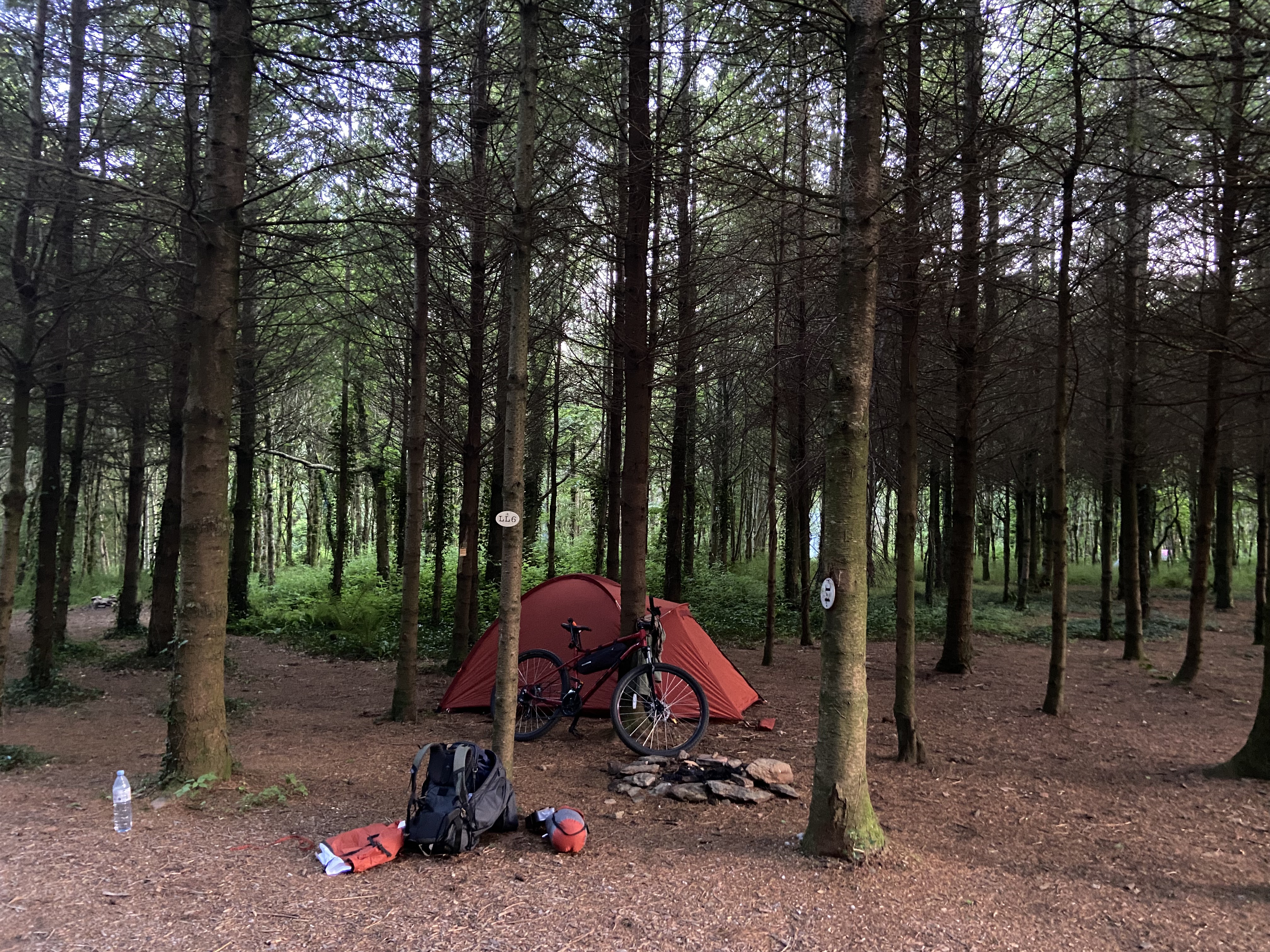
If there was something that I really missed since I moved to the UK, that was wild nature. The smell of grass in the morning, or a sunset without light pollution, or the silence of a forest. These kinds of things can't really be appreciated if your main focus is just to get on with your day to day job, and reach the end of the week without stressing too much.
Historically, I've always had 2 ways to get close to wilderness:
1 - Be a scout
2 - Bike-pack around the world
I haven't explored 1) yet while in the UK because scouts are a life-long commitment (the way I see them), and I'm still emotionally tied to my Italian scout group. But 2) is feasible as a short holiday break of 10 days, so I went for that. For those that don't know what bike-packing is, it's just backpacking with a bike.
Summarizing 10 days is impossible, but I tried
I always hate when people give advices for free but don't give any proof why they might be worth listening to. This video is kind of my proof.
Planning is Essential

No matter the idealized or romantic way that people think about going 'on an adventure' or 'on the road', if you haven't decided to live on the road forever, planning is fundamental. You will later change your plans according to how your trip unfolds, but you need to at least start from a series of places that you want to visit. If you're leaving for 10 days, you might initially plan for visiting 10-15 different places.
-
You will plan how many kms you want to ride per day.
-
You will plan where to get food and water, and where to camp.
-
You will plan what's worth seeing, for how long, and in which days, according to the weather forecast.
Also, planning takes time. I'd say it takes at least 30 minutes to plan each leg. My favourite tools for planning are Google Earth and physical maps. Google Earth is nice for big picture stuff, while physical maps can help you with the details and to make useful annotations that you'll use on your trips. Don't forget to always check elevation maps too, the world it's not 2D.
While Ashburton might not see that high to an inexperienced eye, if you're starting from Newton Abbot you will need to consider that there will be a good climb to get there
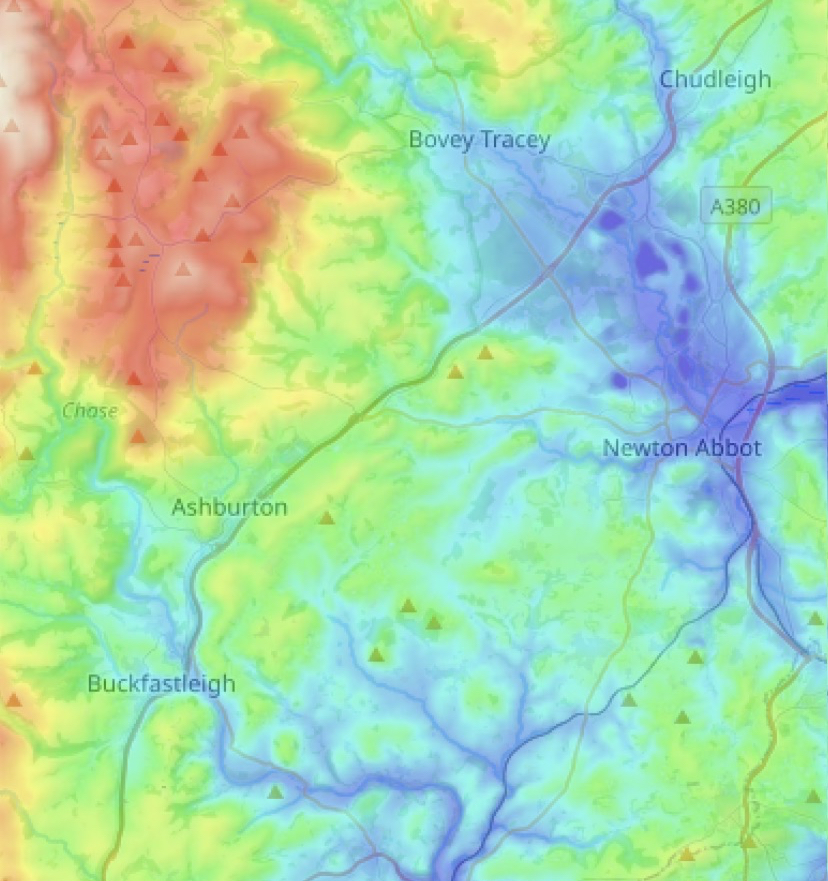
Be Optimistic. The Road will teach you realism
This concerns especially the amount of kms you'll travel each day.
One might think:
I should aim low, I can always aim higher if while travelling I realize I'm doing fine.
That's a purely theoretical perspective of somebody thinking with a belly full of food and water. When you're travelling, it's a lot easier to be lazy, despite the best intentions you had at home. When you're tired, even if just a bit, your ability to take good decision will degrade considerably, and you might not have the willpower (unless you're well trained) to push yourself to the limit. But if you don't push yourself enough, you might miss a lot of the fun.
Things happen to those who seek them.
Optimism is essential to plan a journey that is actually worthwhile: you will plan your travel in your cozy and warm home, in a positive state of mind where you want to see and explore as much as possible in the time you have given yourself.
Optimism doesn't mean being naive, but being willing to push yourself and endure pain for a 'Greater Good'..
If you're feeling down or in a hurry, don't use that time for planning. Go for a walk or do something else. It's important that you set goals that are challenging enough, because when you'll be on the road you will revisit them and you will have a tendency to aim for doing things that require the lowest effort. In that moment, you will not care if you'll skip seeing that amazing waterfall that you planned to see, you will just want to rest and survive. If you're an experience bike-packer, you'll probably hit the sweet spot right on, and all of your planning will match perfectly what you'll end up doing. I'm not saying that you should plan an impossible plan, because that will just be frustrating.
My practical advice is:
- Aim high and highlight why something is important to visit. It will help you understand what can be skipped without impacting your morale.
- Always add buffer days at the end or in-between legs. You'll need time to actually enjoy the 'here and now'.
I'm not a complete beginner (this is my 4th bike trip, but the first completely solo) and I still fail at planning some things. I originally planned of riding 50km (and some days 70kms!) per day. 70 is too much, personally, but 50 is doable, since, if you do the math on paper, it's an average of 2.5 hours of daily riding at 20km/h. That leaves enough time to enjoy the place you visit (the goal is to not to do the Tour de France). On a mostly flat surface, 20km/h is totally doable without getting too tired.
The first day on the hilly roads of Cornwall taught me what 50km of ups and downs really meant. Unless you're travelling very light and you're a professional, 50kms over a hilly (10,17 and sometimes even 25 percent of slope) landscape mean 4 or 5 hours (riding + rest time).
After that first day, I reorganized most of my planning around 20-30 kms daily, and I was still able to visit most of the places that I wanted to visit, even if I planned for 50 km a day. That's because I had a good amount of buffer days at the end of the trip.
Biking with weight is a completely different thing than just biking
If you never biked carrying weigth with you, you'll want to do a few tests before. It's hard to pinpoint exactly how much weight you'll end up carrying, but I'd say that in any tests you do, you should consider to have at least 8-10kgs with you.
The absolute bare minimum weight will be:
- 2L of water (2 kg)
- Food (around 500gr)
- Tent (around 2.5 kg)
- Sleeping bag (around 700gr)
Then you have to add your clothes, essentials for cooking, other accessories like a knife, light, bike tools and spare inner tubes.. which generally would add at least 3-5kgs.
Cooking by yourself is great and will save you money. But guess who's gonna carry that 1L of alcohol?
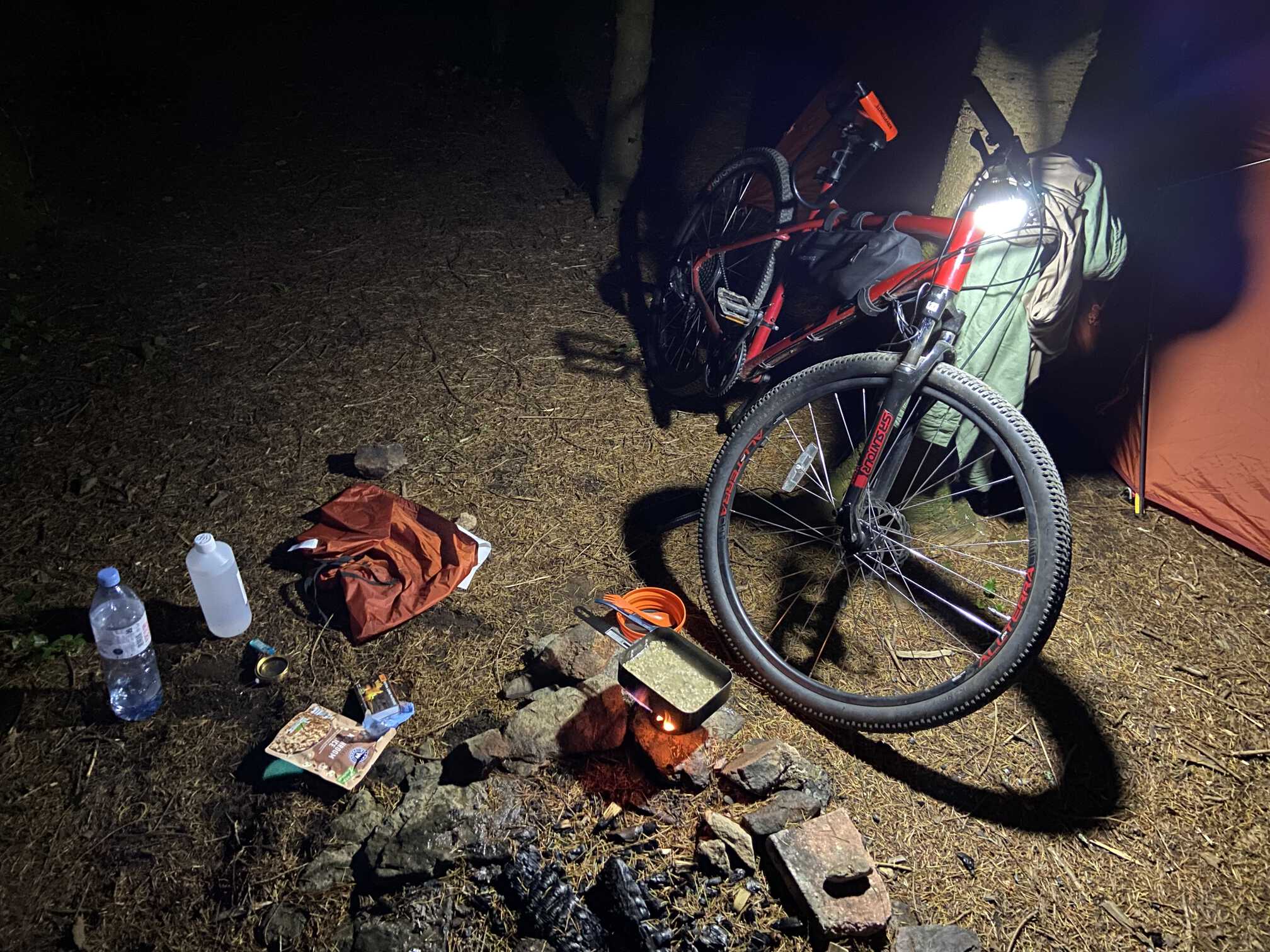
Only carry the essentials. You'll understand what they are
This is a very personal matter, since the burden of some is the salvation of others.
Bringing a philosophy brick with you? A solid yes from me, and an essential part of any philosophy-trip.
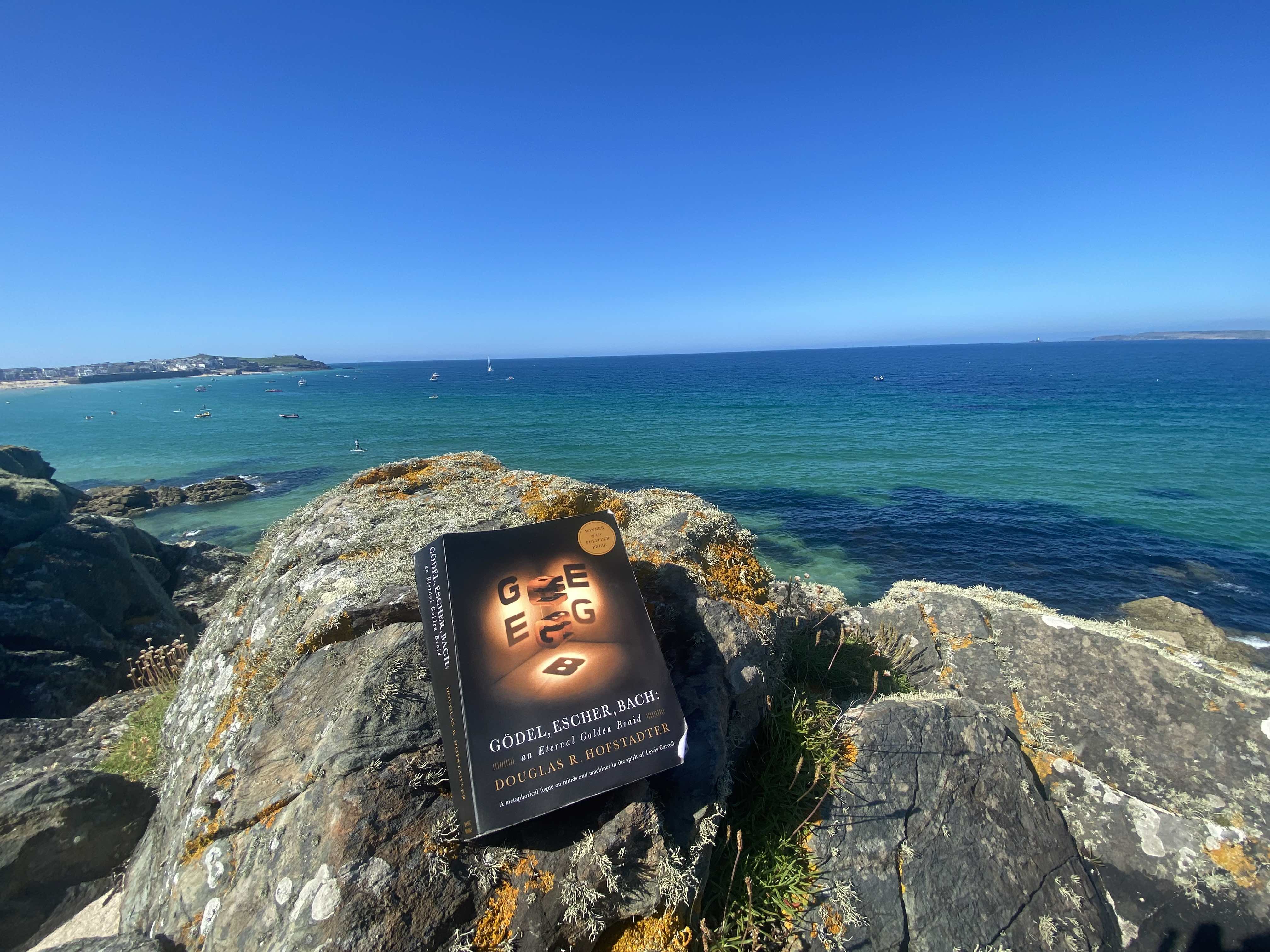
The absoluted essentials (for me) are constitued by:
-
- Bike
-
- Backpack
-
- Tent
-
- Sleeping Bag
-
- Alcohol Stove
-
- Cooking pan
-
- Clothes for riding
-
- Clothes for sleeping
-
- At least 2 additional inner tubes
-
- Multitool simil Leatherman
-
- Extra strings and ropes
-
- A good book
-
- Bike pump
-
- Bike bags
-
- Phone
-
- Camera (if you bring a smartphone, 15 and 16 become one)
-
- Powerbank
-
- Compass
-
- Hats
That's the stuff that I learned would seriously compromise the value of the journey.
1) Bike
I love MTBikes. So far, I've only met 1 other bike-packer that would prefer a mountain bike to a hybrid or a more road oriented bike, since they're more practical and weight less. But for me, biking is about freedom, not speed, and a MTB lets me go anywhere, and take that one wild shortcut through the coast, or the woods.
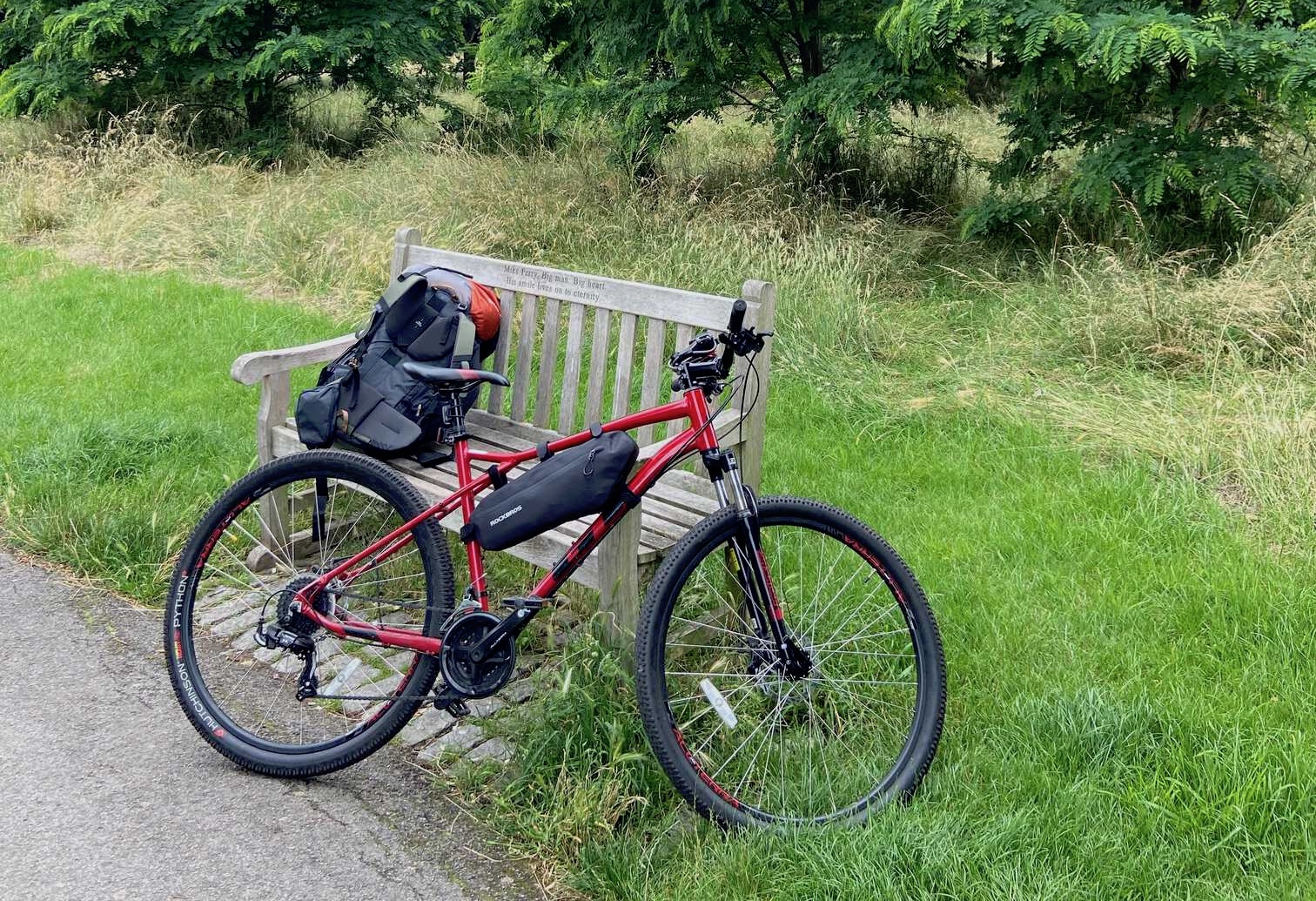
2) Backpack
A common bike-packer will have a very light backpack. I'm not that bike-packer, and I travelled with a 60L backpack. To me 60L is a good compromise, you don't need to fill it completely. A wise advice would be to carry as much as you can on the bike itself. I'm not totally against this advice, but my wicked mind prefers to be able to always carry everything that I need with me, in any moment. Say that in a extreme situation my bike fails to the point that I can't ride it anymore, I still want to be able to leave it behind and continue my leg without it. So my wicked mind uses the approach that the bike carries its owns stuff (inner tubes, tools, pumps, etc.) while I carry my stuff. Don't be like me, unless you're like me.
3) Tent
Nothing to add here. Choose wisely depending on the season. Less than 2kgs is ideal, but rare. 2.5kg is a more common weight. The easier to mount the better, but please avoid the "2-seconds" ones that they sell at Decathlon, they're not meant for travelling and are just uncomfortable to carry.
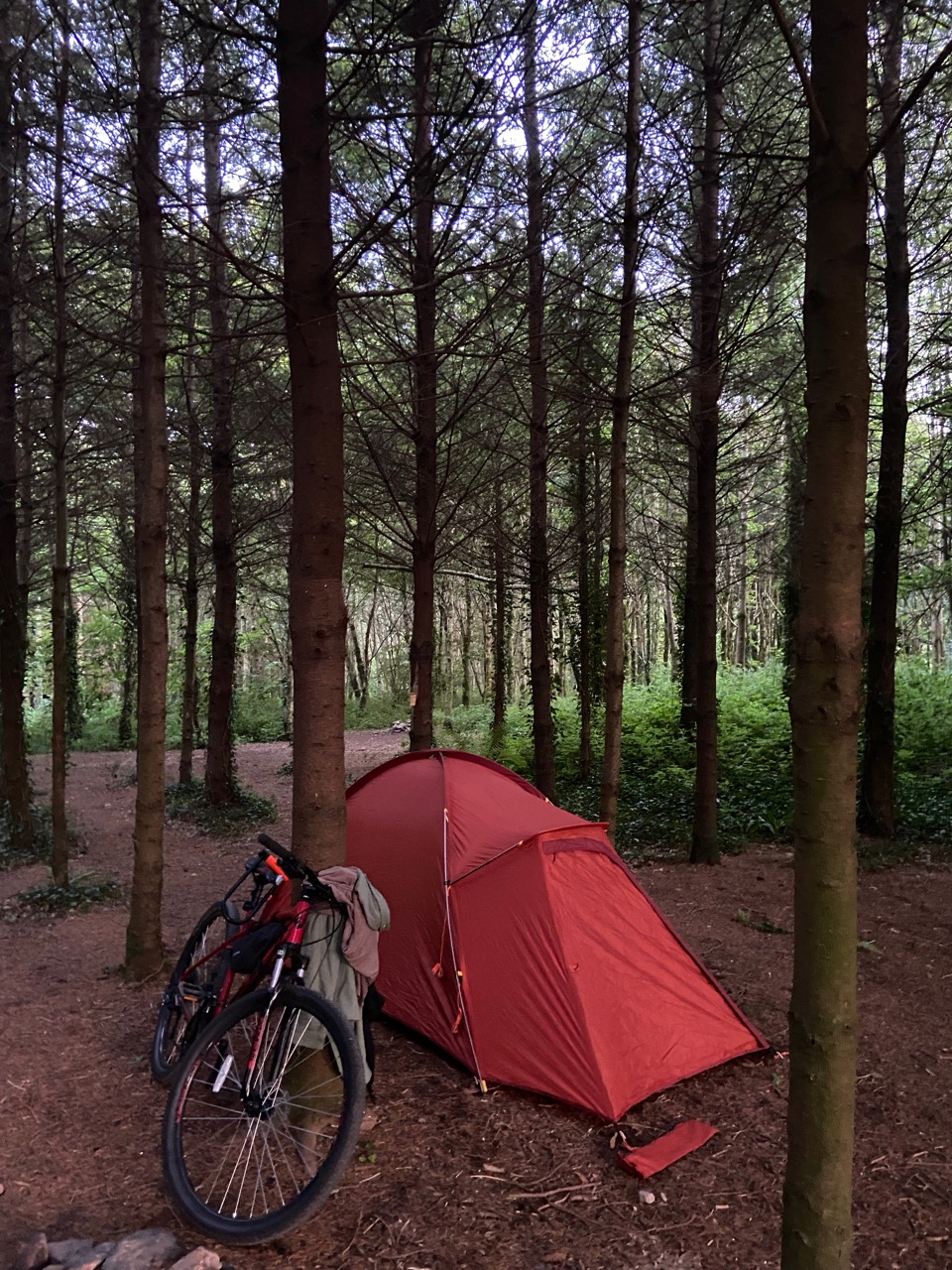
4) Sleeping Bag
Rated for 0 degrees, at least, even in summer (depending where you go). You never know how the temperature could drop at night: if it's too hot, just use it as a partial blanket. You should spend money on that. A sleeping bag is one of the best investments of a bike-packer's life.
5) Alcohol Stove
A good alcohol stove is light, relatively cheap, cooks fast enough and will let you be indipendent. I prefer alcohol to gas because, if all else fails and you're in an extreme situation, it's easier to start a fire with alcohol. It also has the benefit of being carried in a plastic bottle, which is significantly lighter than the gas counterpart (stored in a metallic container). It's also easier to find where to buy alcohol than to find a good matching gas refill for your specific stove model.
On the first day, it took around 6 minutes for this bad boy to boil water!
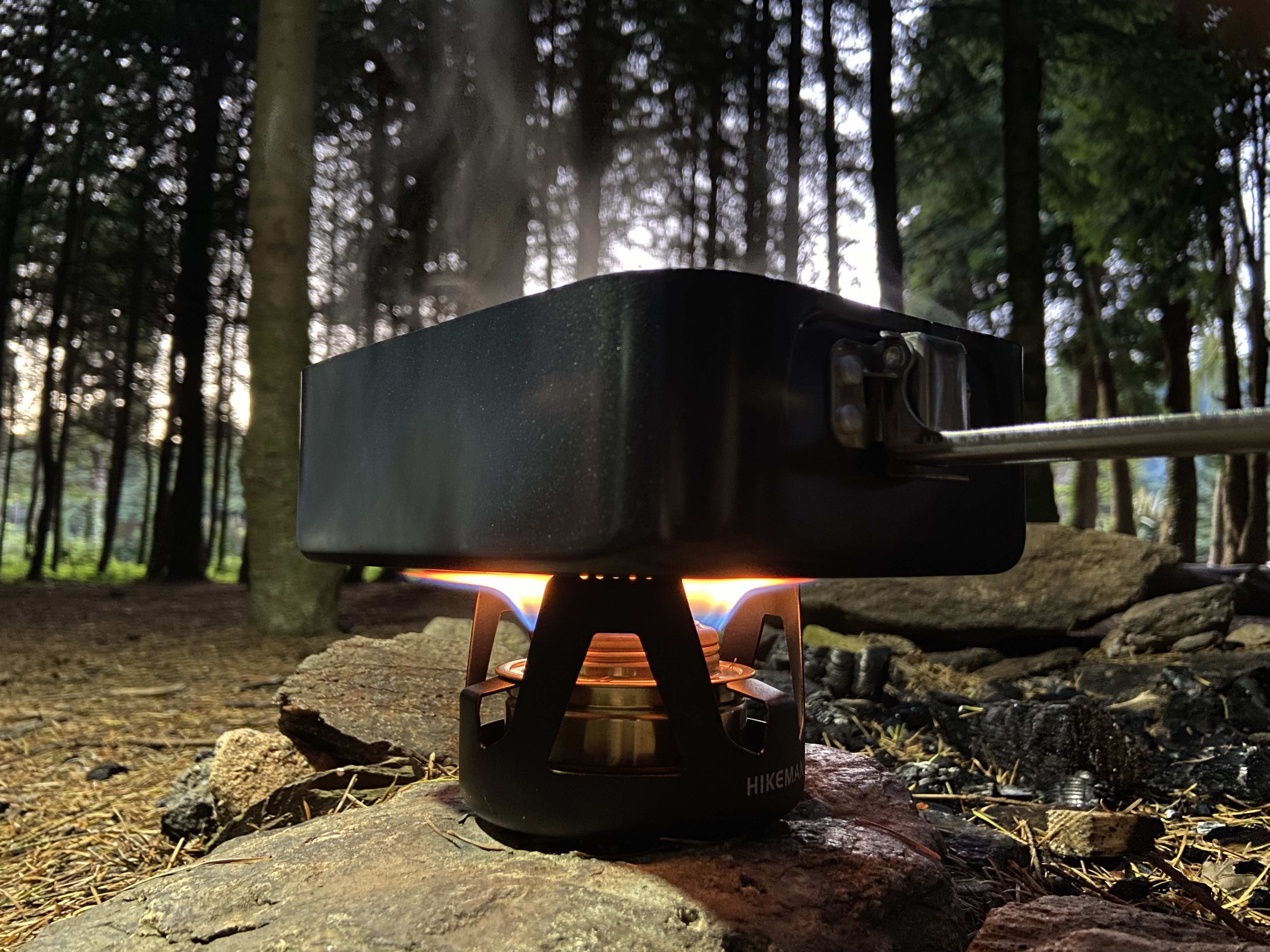
6) Cooking pan
Aluminium, if possible, since that's light. If easy to clean is better (some have a dedicated non-stick 'film', but my experience is that it will eventually tear off). I have come to prefer rectangular pans since you can cook almost anything in them, while the cylindrical ones that develop vertically are less versatile.

7) Clothes for riding
They need to be comfortable. 2-3 pair of shorts and shirts might be enough. You can wash stuff at camping sites, if there's enough sun to let them dry off. At least one pair of shorts should be a dedicated one for biking, with the appropriate reinforcement on the bottom to ease your many hours of cycling.
8) Clothes for sleeping
I used a dedicated sweather and jeans to good effect. It's a very good habit to never mix them with what you're wearing for riding. Always keep them in the driest place possible, possibly in a waterproof bag. Some days you will be so tired that you'll want to just sleep with whatever you're wearing: resist that temptation. Sleeping with dry clean clothes is essential to keep yourself healty.
9) At least 2 additional inner tubes
I brought 5 with me, luckily I never got a puncture. But that stuff can happen, so it's very wise to carry at least 2 extra tubes. Many small towns and cities will not have any bike-shop where to buy one. If you're rich, go tubeless.
10) Multitool simil Leatherman
Nothing to add, it will be handy in many occasions. A knife is essential, pliers are more than welcome for a number of reasons (applying torque, or even just moving stuff without getting your hands dirty).
11) Extra strings/ropes
Extra laces for your shoes in case they wear off, and generic ropes that can be used to wrap stuff together or hang your clothes between a couple of trees to let them dry in the sun. You can also use them to tie bags/etc. to the bike.
12) A good book (generally related to philosophy)
It will give another dimension to the journey, and will alleviate the days where you decide to just relax. I generally pick philosophy because it lets me enter a different world, and it opens my mind to things that I would rarely have the headspace to think about during my 'normal' days.
13) Bike pump
I have brought with me both a manual (if all goes wrong) and an electric one (a Xiaomi Mijia), which is light and inflates quite fast up to the target PSI I choose. One always hopes to not need to use it, of course.
14) Bike bags
Choose wisely. Bags that will fit in the frame of you bike to carry extra stuff. There's 3 places where such bags can be placed: on the handlebars, in the middle triangle of the frame, and on the tail. Balance them well so that they can resist uneven terrain, eventual small jumps, etc.. There's nothing worst than having to constatly tighten that loose bag that keeps moving on a side, fighting your own balance.
15) Phone
To keep a communication channel with the outside world and let your cared ones know you're alive and how awesome that cliff today has been. Solo travelling can be though, being able to write or chat to someone can be a good way to stop thinking about how much you're tired today. This can be a smartphone, but I've learned to avoid using mapping apps to understand where to go. Some apps might be useful to understand your average speed, especially in the first days, and better calibrate the next legs. For all practical purposes, using physical maps and looking around for signs will help you go a long way, even if sometimes a quick look at a GPS (even if offline) will immediately tell you if you're on the right road or not.
16) Camera
Bike-packing (especially if alone!) is a life changing experience. Take some memories. I generally carry a go-pro with 2-3 additional batteries. It has proved to be enough for 10 days, if used wisely.
This gopro black 7 has seen better days. But it still serves me well!
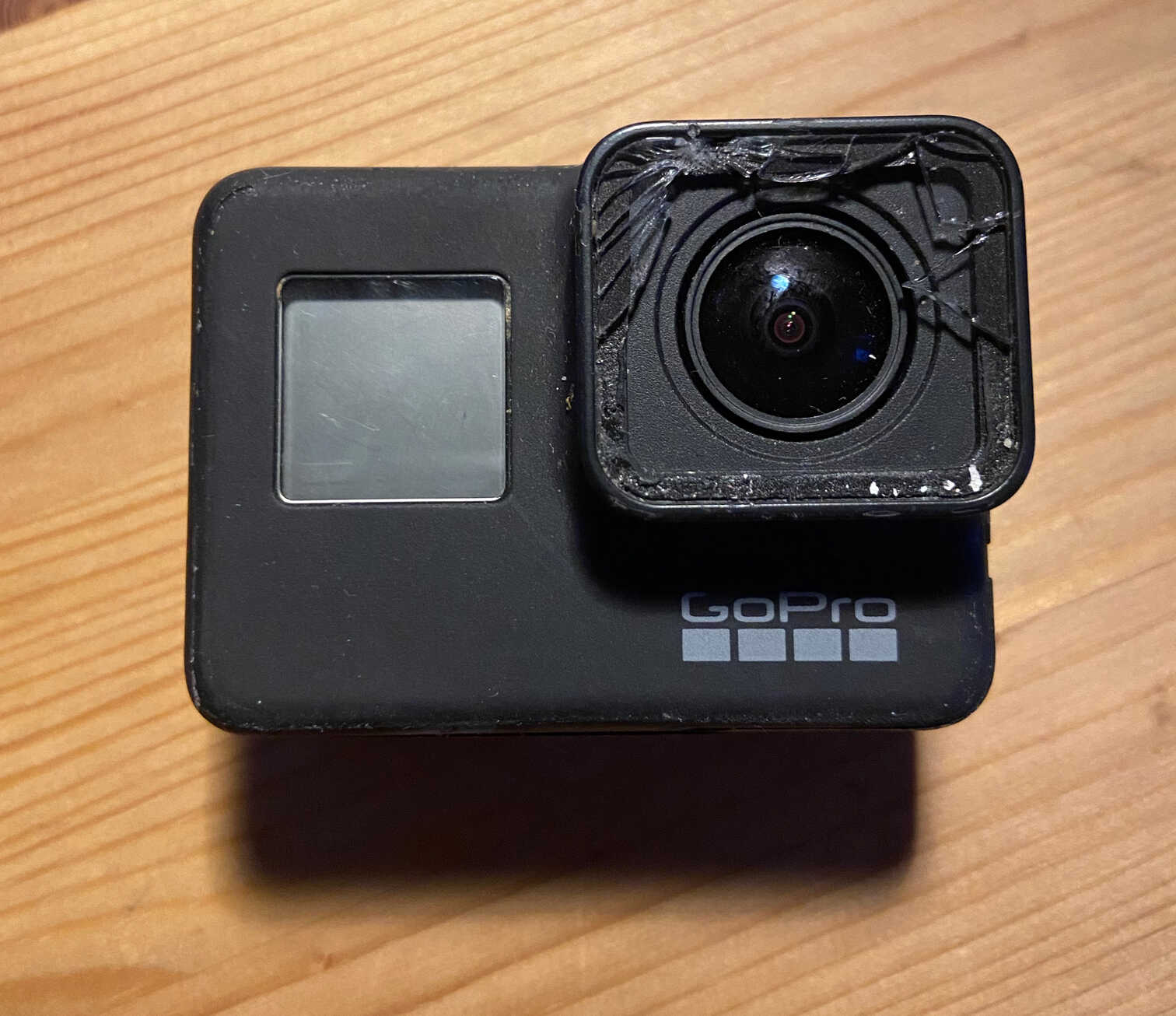
17) Powerbank
I recommend something with at least 20 Ampere. That seems like a lot, but nowadays a lot of gadgets can be recharged via usb, so having enough juice will let you enjoy some of these gadgets. Why essential? Because if you're in real danger you need to have a way to be sure to always have your phone charged.
18) Compass
Extremely useful to orient yourself without the need for any other electronic gadget. Sometimes, knowing that you have to 'aim East and follow that road' is all you will need.
19) Hats
Come rain or sunshine, a baseball cap will be your best friend. A cap avoids rain falling into your eyes, protects your head and face from excessive sun, and acts a temporary container to carry stuff, etc.. A nice sleeping hat to keep your head warm is also a wise move.